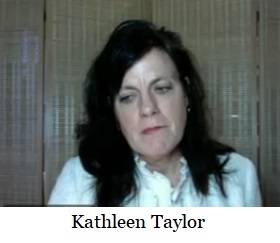 Post an Event
Post an Event
| Benton County Republicans’ Private Fundraising Event, “Bent-on Boots and Bling” with Trey Taylor |
| Friday, September 5, 2025 at 5:00 pm |
| Featuring Trey Taylor
Music Private Event
Friday, September 5, 2025 5:00-5:30 pm VIP Reception
5:30-8:00 pm Heavy Appetizers,
Auction, Concert
Red: $750 VIP Reception
Front Row Table Sponsor
White: $500 Table Sponsor
Blue: $50 per person
Limited Seating. Get Yours Now!!!
Support Local
Dress up: Bling, Cowboy, Patriotic Benton County Republican
FUNDRAISER
www.BentonGOP.org
Get your tickets today at:
https://www.bentongop.org/event-details/benton-county-republicans-fundraiser/form
About Trey:
Trey is the youngest African American Man in Country Music History. The Denver Post wrote
"It's impossible to miss his enthusiasm. With a fondness for cowboy boots, gaudy colors and dazzling jewelry, Trey Taylor could stand toe to toe with any of the Pop, Country or even Rap
contemporaries of his generation.“ |
| Trysting Tree Golf Club, 34028 NE Electric Rd., Corvallis |
Overall support for school choice is increasing
Senate Republicans proposed an addition to
HB 2954 to allow more students options in their education.
The minority report, carried by Senator Chuck Thomsen (R-Hood River), mirrors the bill passed out of committee, but would also raise the decade-old arbitrary cap on virtual public charter school enrollment from three percent to four percent of the school district’s student population.
“The reality is, many students don’t thrive under traditional learning models,†said Senator Thomsen, the vice-chair of the Senate Education Committee. “Virtual public charter schools are a great option for many kids for many different reasons, whether it be bullying, the flexibility to learn at their own pace, or to accommodate mental and physical health conditions. The current cap is a cap on student potential. It doesn’t serve what should be the main goal of our education system: to serve Oregon students’ needs and set them up for future success.â€
Despite overwhelming support from families and students to raise the cap, Democrats voted in lockstep to defeat the motion to include this provision.
“This is the time for real education reform,†said Senate Republican Leader Fred Girod (R-Lyons). “This session, the Democrats have lowered education standards and avoided meaningful reform by throwing more money at a failing system. School choice is fundamentally about giving students, regardless of wealth, the best education possible for them. Republicans will continue to be the party of educational opportunity and school choice.â€
Increasing the cap on virtual charter schools would have been a small victory for those trapped in a system that doesn’t meet their needs. For communities of color and low-income households, too few education options exist. Without options, families will be stuck in a failing system that hinders upward mobility. Giving these families the freedom to choose an education that works for their students
correlates with increased academic achievement.
Despite
promising to promote “Access and Equity in Public Education,†Senate Democrats have blocked all school choice measures from advancing this session, including a measure that would have completely lifted the cap on virtual public charter school attendance. Senate Democrats held a public hearing for SB 240, but only after it was ‘dead’ due to legislative deadlines.
Public support for school choice has skyrocketed since the onset of the pandemic. Traditional, government-run public school models were no longer a viable option for many, including our most vulnerable populations. When Governor Brown shut down schools in the spring of 2020, students and parents flocked to virtual public charter schools. The current three percent cap on enrollment led to record transfer rejection numbers. Since July of 2020, the Oregon Department of Education has received at least 839 rejection appeals, the vast majority of which have been upheld without reasonable explanation as to why.
A D V E R T I S E M E N T

A D V E R T I S E M E N T
Yet, at least 41 school districts in Oregon have exceeded the three percent cap on virtual public charter school attendance, further demonstrating the demand for education alternatives. New data from
Real Clear Opinion Research finds overall support for school choice is increasing as parents need more options than ever before:
- 69 percent of Democrats and 75 percent of Republicans back school choice, the highest level of support ever recorded from major American Federation for Children polling.
The support is also consistent among various ethnic groups: 73 percent White; 68 percent Hispanic; 66 percent Black; and 66 percent Asian.
- 66 percent of Democrats and 67 percent of Republicans support parents having access to a portion of per-pupil funding to use for home, virtual, or private education if public schools don’t reopen full-time for in-person classes.
The minority report for
HB 2954 was voted down by Democrats. The Senate passed the original bill that carries the same language but fails to provide necessary education options.
--Staff Reports| Post Date: 2021-06-09 10:38:04 | Last Update: 2021-06-09 12:19:58 |
Has real science become subservient to political institutions?
Senator Dennis Linthicum (R-Klamath Falls) gave a speech on the Senate floor blasting the government’s response to COVID-19. According to the Senator, from Dr. Fauci, OHA Director Patrick Allen, and on to Governor Kate Brown, Oregonians were misled about the viruses' origins, masks, and virus transmission.
“Fauci’s emails are a perfect example of what happens when politics is put before science and when power is pursued before good policy. Governments at all levels were weaponized into bureaucratic machines of destruction that trampled on Oregonian's freedoms. When the government mandates are followed without the careful review of evidence and science, tyranny is the only result.
“Built on flimsy evidence, masks have now become a cult-like religious symbol. Despite the data coming in from around the world, some are so committed to masks that they will never take them off. The lies, the fear-mongering, and the propaganda were, and are, unwarranted by science. Public recognition is now breaking through the government’s façade and it is being exposed for what it has always been. Government agencies have mistakenly devastated the health, outlook, common sense, and financial stability of many of our most vulnerable populations.
“It is well past time to give Oregonians their liberties back. It's beyond time to allow Oregonians to make calculated risk assessments about their own lives and their own risks.â€
--Staff Reports| Post Date: 2021-06-09 10:33:50 | |
“I want victims to know that it is safe to come forwardâ€
Representative Shelly Boshart Davis (R-Albany) has introduced House Resolution 4 to formally censure Representative Brad Witt (D-Clatskanie).
The resolution was introduced following the failure of the House Committee on Conduct to agree on appropriate consequences for Representative Witt’s violation of sexual harassment rules.
“This response is necessary for us to take as a legislative body to declare that this kind of behavior has no place in our Capitol,†said Representative Boshart Davis. “This should have been recommended by the House Committee on Conduct, but unfortunately they failed to reach agreement. Furthermore, the announcement from the Speaker’s office that merely takes a gavel from someone who committed sexual harassment is an inadequate response to address a hostile work environment in the building. I want victims to know that it is safe to come forward, and this is the only way.â€
--Staff Reports| Post Date: 2021-06-08 20:02:49 | Last Update: 2021-06-08 20:17:47 |
Would ban implementation of discriminatory vaccine passports
State Representative Mark Owens (R-Crane) introduced
HB 3407 to ban the implementation of vaccine passports in Oregon and protect the privacy and rights of Oregonians.
“Requiring proof of vaccinations via a vaccine passport program is wrong and it opens the door to myriad problems,†said Rep. Owens. “It's a violation of our privacy and our freedoms, it’s discriminatory, and it shows the Governor doesn’t believe Oregonians can be trusted.â€
The legislation would prevent any public body -- state, local or special government body -- from issuing a requirement for proof of vaccination through a vaccine passport from COVID-19 or variants of COVID-19.
“Let me be clear -- this is not an argument over COVID-19 or the COVID-19 vaccine. It’s about Oregonians’ rights. I believe the choice to get a vaccine is a personal, private medical decision that should be made between an individual and their medical provider, and that Oregonians should be free to make that choice for themselves,†said Owens.
In addition, in order to prevent discriminatory actions and repercussions, it would prohibit a person or public body from being able to legally require an individual to state or document vaccine status against COVID-19 to access credit, insurance, education, facilities, medical services, housing or accommodations, travel, entry into this state, employment or purchase goods or services.
It would also prohibit these entities from being legally able to require an individual to wear a face covering if the individual does not wish to disclose vaccine status.
The bill applies only to the COVID-19 vaccinations and would not change any current laws with regards to immunizations for other restrictable diseases for schools and children’s facilities.
HB 3407 is requested in partnership with Eastern Oregon Counties Association and would go into effect immediately upon passage. At the time of press, the legislation has 12 Chief Co-Sponsors including House and Senate members and bipartisan support in the House.
--Staff Reports| Post Date: 2021-06-08 09:52:56 | |
He would be the first to be expelled in the history of Oregon
The Oregon House of Representatives is poised to expel one of it's members. House Speaker Tina Kotek (D-Portland), failing to get Representative Mike Nearman to resign his seat, has introduced
HR 3 which would expel Representative Nearman from the Legislature.
Be It Resolved by the House of Representatives of the State of Oregon:
That we, the members of the House of Representatives of the Eighty-first Legislative Assembly, find that Representative Mike Nearman has engaged in disorderly behavior within the meaning of Article IV, section 15, of the Oregon Constitution, and be it further
Resolved, That, with the concurrence of two-thirds of the members of the House of Representatives, Representative Nearman be expelled from the House of Representatives and that Representative Nearman’s seat be considered vacant.
Speaker Kotek introduced the resolution to expel Nearman in a surprise move just two days before he was scheduled to appear before the House Committee on Conduct. That meeting has since been cancelled. Insiders are speculating that for some reason, Speaker Kotek and her fellow Democrats were afraid to let that process go forward, and chose instead just to bring an expulsion measure to the floor. The expulsion vote requires a 2/3 majority, so at least three Republicans were needed to vote to expel.
A special committee has been created to have a hearing on
HR 3, The House Special Committee On December 21, 2020. The resolution will be heard Thursday afternoon at 3:00pm. For those wishing to submit testimony,
a link has been provided on the Legislative website. The committee will also be taking live, virtual testimony from the public.
--Staff Reports| Post Date: 2021-06-08 07:36:39 | Last Update: 2021-06-08 20:02:49 |
Over 115 officers have left the Portland Police Bureau
Over the last year, violence, chaos, and organized crime have crippled Portland and are increasing across Oregon’s cities. Oregon has become known nationally for left-wing political violence. Police funding has been slashed, leading to record levels of gun violence and murder. Officers have been demonized and attacked constantly over the last year, leading to staff shortages and service cuts.
Today Senate Republicans forced a vote to consider
SB 547, a bill to pay law enforcement officers double-time for responding to riots and violent demonstrations. Senate Democrats voted in lockstep to say ‘no’ to more pay for these officers.
“Our shortage of police officers and increasing violent crime are not unrelated,†said Assistant Senate Republican Leader Lynn Findley (R-Vale), who made the motion on the floor and is a sponsor of the legislation. “We need to find ways to attract qualified candidates to help protect our communities. Over the last year, policing has become an increasingly thankless job. The legislature is doing a lot to change how they do their jobs. It’s time to thank them for keeping us safe.â€
Last week, the Senate passed
HB 3059, which would make breaking up riots optional for police departments.
SB 547 would reward police officers who put their health and safety on the line to enforce laws for the protection of lives and property by breaking up a riot.
“Beefing up pay for our police officers who put their lives on the line for the safety of our communities is the least we can do to say thank you,†said Senate Republican Leader Fred Girod (R-Lyons). “Their jobs have become exponentially more difficult in the last year. The inability of Portland officials to enforce the law has put countless lives in danger and has in part led to burnout. The legislature needs to step up to support our officers.â€
Since July of last year, over 115 officers have left the Portland Police Bureau. The Department of Oregon State Police has 64 openings for troopers. Oregon police departments experienced a 10% increase in police separations last year. According to the International Association of Chiefs of Police, 65% of police departments around the country have too few applicants. 25% are reducing services because of these shortages.
The vote to withdraw
SB 547 was shot down by Senate Democrats and will stay dead in committee while violence continues across our state.
 --Staff Reports
--Staff Reports| Post Date: 2021-06-07 16:06:37 | |
HB 2648 allows pseudoephedrine products to be sold
A proposal from Representative Bill Post (R-Keizer) to allow the sale
of pseudoephedrine products without a prescription passed out of the Senate today and
will be sent to the Governor’s desk.
This is the third attempt from Rep. Post to remove an unnecessary barrier for
Oregonians that will lower their health care costs when purchasing pseudoephedrine
products. Sudafed and other similar drugs will still be restricted to people who are at
least 18 years of age with a valid ID under the proposal.
Currently, purchasing a pseudoephedrine product requires a visit to your doctor to
receive a prescription, which comes with an expensive bill.
“Third time is the charm to pass this common-sense bill which will help Oregonians
looking for a quick and affordable remedy for allergies and head colds,†said Rep. Post.
“People shouldn’t be asked to visit a doctor to obtain a prescription for common cold
medicine, especially when Oregon is the ONLY state requiring a prescription. We can
trust Oregonians more than that.â€
HB 2648 passed out of the Senate with bipartisan support.
--Bruce Armstrong| Post Date: 2021-06-07 12:29:52 | Last Update: 2021-06-07 12:38:40 |
Fully reopened doesn’t mean what you think
Oregon's Governor Kate Brown recently
addressed the public in a press conference where she detailed what she intends for Oregon now that the Covid vaccination goal she set is about to be met. Brown has stated that when Oregon reaches 70% first dose vaccination rate for adults, most county and individual health and safety restrictions will lift.
It seems that she knew that Oregonians want to hear her say that she will fully reopen Oregon's economy, so those are the exact words she used.
"What does fully reopen mean?", Brown said. "Masks will "largely" no longer be required in businesses and most other places, with the exception of public settings currently outlined by the CDC such as public transportation."
"No more physical distancing," Brown added."
In discerning what she really means by this, however, it seems that she very much intends on keeping as many restrictions in place as she can, even among school children.
As of June 3, Oregon had achieved a 66.2% vaccination rate for individuals 18 and older, with 127,308 more people needing to receive a first dose to reach 70%.
“I want to be very clear that we are able to reopen like this because of the efficacy of the vaccines. For those of you who are vaccinated, you’ve helped us reach this point — and you are protected from this virus,†said Governor Brown. “However, there are still Oregonians who need to take extra precautions to feel and stay safe. People battling cancer and immunocompromised Oregonians, to name a couple. There are also many Oregon kids who are not yet eligible for a vaccine.
“So, it will remain incredibly important for Oregonians to continue making smart choices. And, to respect the choices of others. Let’s respect one another as we prepare to make this transition.
“This has really become a tale of two pandemics. If you are vaccinated, then you’re safe, you can carry on safely without wearing a mask and social distancing.
“If you are not vaccinated, this virus still poses a very real threat.â€
It seems that the OHA does not have any guidance on whether actual COVID survivors should be vaccinated, as they would likely already have natural immunity to the virus.
Details of the restrictions that will remain for school children were provided by Brown and outlined here:
- Because many children are still not eligible for vaccination and remain vulnerable to COVID-19, local schools will be guided by health and safety guidance as students resume a normal school year in the fall.
- Students will attend school full-time, five days per week, however, K-12 guidance is being revised to support schools in safely delivering in-person instruction throughout the school day.
- For the same reasons, some health and safety standards for child care providers and youth programs will remain in place.
- Recently revised workplace standards, including indoor mask requirements for unvaccinated employees, remain in place for schools and child care settings.
- For colleges and universities, where students are eligible for vaccination, individual institutions will make decisions about health and safety protocols for the coming year, after considering forthcoming CDC guidance.
Skeptics of Brown's "reopening announcement" believe that she intends to keep these and other restrictions in place, as well as the continued state of emergency.
--Bruce Armstrong| Post Date: 2021-06-07 09:39:58 | Last Update: 2021-06-07 10:28:53 |
Public hearing announced late
As if there weren't enough disincentives for business in Oregon with increasing taxation coming from the Kate Brown administration, more tax bills keep coming, with the intent of finding additional sources of revenue to cover the State's out of control spending habit.
There is yet another small business tax proposal from Oregon Democrats that is scheduled for a public hearing in the
Senate Finance and Revenue hearing this Monday, June 7, at 1:00. It was only made public on late on Friday before the weekend so that people would not know about it until the last minute. You can find
the link to that meeting by clicking here.
The bill is
SB 139 and it will raise the tax rate for small businesses that are also known as pass-throughs income.
This tax only applies to small businesses.
Scott Bruun, Director of Tax and Fiscal Policy for
Oregon Business and Industry gave the following
testimony earlier this session:
"SB 139 would raise taxes on thousands of Oregon partnership businesses at a time
when many of those businesses are still reeling from the economic effects of COVID.
These businesses are not the euphemistic “large corporations,†they are small and
medium-size businesses that operate in every corner of our state, and in every
commercial business activity you could think of. These could be businesses with two
employees, 20 employees, or even 200 employees, each with an interest in keeping
those employees working and maintaining operations during perhaps the biggest
economic challenge of our lifetime."
"There is no question that some Oregon businesses have done well during the current
crisis. Some have even done exceptionally well. That’s actually great news! It’s
something we should celebrate, not punish or lament. Those businesses, whether they
employ 2 or 200, have kept Oregon moving forward. They’ve kept their people working;
they have played by the rules; they’ve overcome hurdles; and they will pay the full taxes
they owe under current statute - more than they would pay, of course, if they had not
done as well."
"But we shouldn’t let success stories sidetrack us. The fact is most businesses have
suffered and are behind where they would otherwise be if not for COVID. SB 139 would
raise taxes on those businesses during this time of economic stress. These tax
increases would make it harder for Oregon businesses to compete, harder for them to
hire, harder for them to give raises, and maybe even harder for them to retain the
people they currently employ."
"It is also important to remember, as we’ve discussed before, that every Oregon
business, partnership or not, will already be experiencing a 41% increase in their overall
tax burden by 2022 when tax measures approved in 2019 are fully implemented.
COVID notwithstanding, Oregon’s business tax burden has increased from 40th highest in the nation, to 19th highest in a very short period of time. Respectfully, the businesses
which employ Oregonians are having a hard enough time swallowing that big pill, they
are certainly not in a position to take on yet another tax increase.
--Bruce Armstrong| Post Date: 2021-06-06 16:12:34 | Last Update: 2021-06-07 18:30:37 |
Has Governor Brown Reduced Bed Counts?
While other states continue to open and show a decrease in hospitalizations and COVID-19 cases, such as Texas, Oregon has remained locked down with excessive restrictions on severely struggling businesses.
Governor Kate Brown has now imposed a three-week lock-down, despite the minimal COVID impact Oregon has seen when measured against other state case and fatality data nationwide and worldwide.
The “two weeks to flatten the curve†lock-down measures she announced in March 2020 were meant to help our healthcare systems get through an additional surge. Yet Governor Brown has announced that 15 counties back into the “extreme high risk†category for COVID-19, and also re-instituting restrictions on other Oregon counties.
She claims that hospitals are beginning to overflow once again with COVID-19 patients. But is that really true?
According to the Oregon Health Authority, as of April 23rd, 2021, out of approximately 3.8 million residents, there are only 305 Oregonians currently hospitalized due to COVID, with 543 Adult non-ICU beds and 149 Adult ICU beds still available specifically for COVID-19 patients.

This is a far cry from the winter peak of COVID-19 hospitalizations on December 14th, 2020, where 601 Oregonians were hospitalized due to COVID, while an additional 739 Adult non-ICU beds and 149 Adult ICU beds remained available for COVID-19 patients.
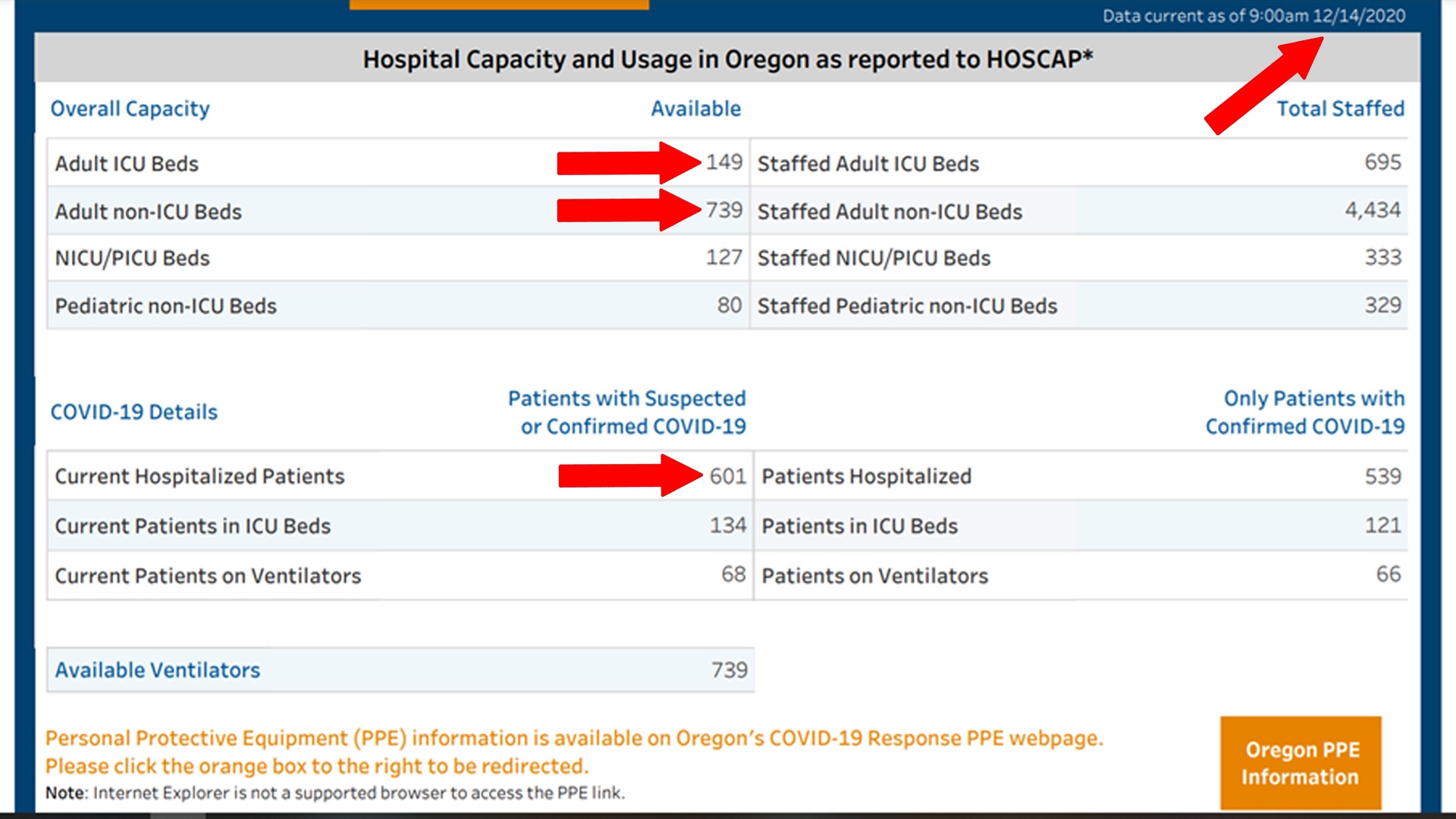
On December 14th, 2020, there were 1,489 total hospital beds allocated for COVID-19 patients, but that by April 23rd, 2021, it seems that number had been reduced to only 997 hospital beds.
We can all agree that, if this is still an emergency situation that hospital bed counts should be maintained at 1,489 until the crisis is over. That doesn't seem to be what has been happening, according to School Superintendent Marc Theilman, of the Alsea School District, who has been in weekly contact with hospitals to stay abreast of the situation after concluding he could not rely exclusively on Oregon Health Authority(OHA)data.
“You know, it’s been interesting because the information I’ve been getting from hospital staff hasn’t been that the situation is getting worse again, despite the concern over variants, a lack of preventative nutritional guidance issued or access to available medical treatments known to be effective that are separate from the vaccine rollout,†shared Thielman. “And, despite what Brown’s Friday meeting tried to paint a picture of, the current situation is not about those who are choosing to forgo receiving an experimental vaccine—the reality is that hospitals are removing available beds for COVID-19 patients, as it’s not economically feasible to keep so many beds empty. However, this is an easy data point to manipulate to use to tell the public that hospital capacity is getting maxed out,†he added. “In fact, I just spoke with a ranking member of the Oregon Nurses Association who gave me advanced warning about the political narrative being set forth,†said Theilman, “As one contact put it, ‘the reality is that bed use continues to dramatically decline’ and he told me, don’t believe the spin, he actually said we should be celebrating at the waning of this pandemic.â€
“What hospital staff have been sharing with me is that they have been reducing their COVID bed counts due to lack of public need so they could make those beds available for people who actually are in need with other conditions,†Thielman noted. “I was told point blank that they’ve been in discussions with representatives from Governor Brown’s office and that she’s fully aware of these reductions. Personally, I think this is good news and should be openly discussed, not be a reason to consider going back into lockdowns,†he added. “Since there seems to be federal money for this very purpose, we should just increase bed counts again if necessary, without disrupting the lives of countless Oregonians, who have been great throughout this—that would make the most sense to me.â€
Critics are wondering if Governor Brown may not be telling the public that she authorized the reduction in COVID bed counts.
In 2008, and quite possibly during other years as well, Oregon received Federal grants specifically to help build pandemic preparedness.
And here is a another newsletter statement, describing additional federal grant money:
With any previous federal funds and additional money in new federal aid that Oregon has received over the last year, it seems that Governor Brown could simply support hospitals financially, in the isolated counties where hospitalizations may be rising slightly, to increase their available bed counts once again.
Oregonians will definitely have to continue to pick up the pieces created not just by COVID, but by abysmal public health policies that sometimes create an illusion of responsible action, but in fact only hurt healthy residents ready to get on with their lives.
--Staff Reports| Post Date: 2021-06-06 11:59:50 | Last Update: 2021-06-06 12:01:34 |
Do they have to wear a mask? Asking for a friend.
The Centers for Disease Control and the Oregon Health Authority have provided updated guidance on mask requirements for those with synthetic immunity -- from a vaccine -- but have failed to create guidance for those who have natural immunity from having had the disease.
The numbers are not large, but neither are they trivial. According to the OHA website,
there have been 202,675 cases, which when spread among 4,300,000 means that about 4.7% of Oregonians have had a recorded case. This number needs some adjustment. Some unrecorded cases need to be added. Some 2,686 deaths need to be subtracted as do cases that were subsequently vaccinated, but a number of persons near 5% are COVID survivors.
The CDC suggests that COVID survivors get the vaccine, but candidly admits that it doesn't know.
Yes, you should be vaccinated regardless of whether you already had COVID-19. That’s because experts do not yet know how long you are protected from getting sick again after recovering from COVID-19. Even if you have already recovered from COVID-19, it is possible—although rare—that you could be infected with the virus that causes COVID-19 again. Learn more about why getting vaccinated is a safer way to build protection than getting infected.
If you were treated for COVID-19 with monoclonal antibodies or convalescent plasma, you should wait 90 days before getting a COVID-19 vaccine. Talk to your doctor if you are unsure what treatments you received or if you have more questions about getting a COVID-19 vaccine.
Experts are still learning more about how long vaccines protect against COVID-19 in real-world conditions. CDC will keep the public informed as new evidence becomes available.
The OHA does not have any guidance on whether COVID survivors should be vaccinated.
--Staff Reports| Post Date: 2021-06-05 21:22:53 | Last Update: 2021-06-06 09:12:15 |
Proposal may further discourage commerce
There is a proposal in the Oregon legislature which would add the exposure to COVID-19 as a occupational hazard which may require the worker to be financially compensated by the employer.
SB 488 is sponsored by Senator Kathleen Taylor (D-Portland) and currently sits in the Oregon legislature's
Senate Committee On Labor and Business.
The bill includes the following details:
- Adds exposure to or infection by SARS-CoV-2 to definition of occupational disease for purposes of workers' compensation.
- Specifies presumptions as to compensability for occupational disease or occupational injury that apply to subject worker's death, disability, impairment of health, loss of work time and expenses of medical treatment or services, including diagnostic or preventive medical treatment or services, as result of exposure to SARS-CoV-2 or COVID-19.
- Sunsets provisions on 180th day following expiration or termination of Governor's declaration of emergency concerning COVID-19 pandemic, including any extension of declaration. Declares emergency, effective on passage.
As they often do, the Supermajority Democrats in the Oregon legislature attached the emergency clause to the bill, rendering it not able to be referred to the voter's of Oregon via citizen referendum.
--Bruce Armstrong| Post Date: 2021-06-05 17:46:34 | Last Update: 2021-06-05 21:36:29 |
Read More Articles








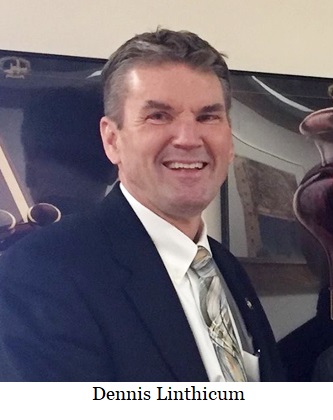


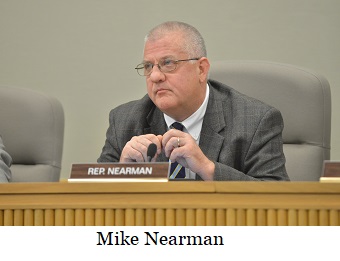


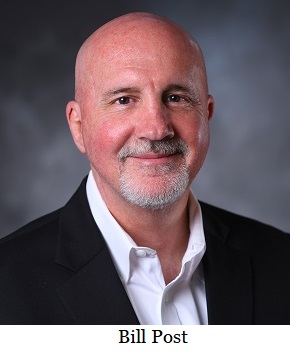



 This is a far cry from the winter peak of COVID-19 hospitalizations on December 14th, 2020, where 601 Oregonians were hospitalized due to COVID, while an additional 739 Adult non-ICU beds and 149 Adult ICU beds remained available for COVID-19 patients.
This is a far cry from the winter peak of COVID-19 hospitalizations on December 14th, 2020, where 601 Oregonians were hospitalized due to COVID, while an additional 739 Adult non-ICU beds and 149 Adult ICU beds remained available for COVID-19 patients.


